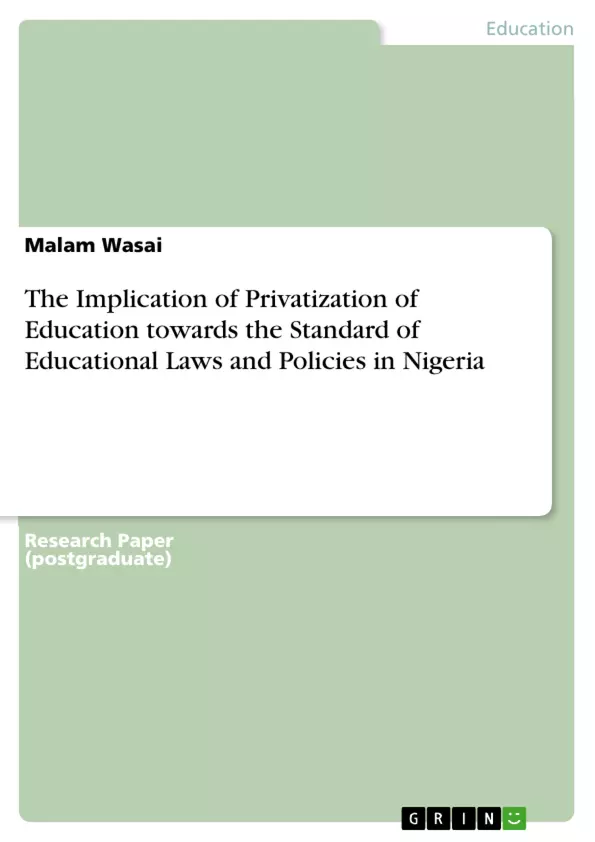This article focuses on the impact of privatization of education on the teaching and learning process. The research was conducted using both direct and indirect approaches. The researcher used interviews, reference citations, anecdotal records, and an opinion questionnaire as data collection tools.
The researcher analyzes and presents the data obtained from the target groups. However, the findings of the research show that the main problems in teaching and learning are the inadequate implementation of education laws and policies and the contextual examination of privatization policies in education at all levels (primary, post-primary, and tertiary) to establish standards. Despite the confluence of factors such as dilapidated classrooms, inefficient infrastructure facilities, and a scarcity of qualified teachers to support the learning process, the lack of effective community participation in monitoring standards is also a contributing factor. Moreover, the indigenous education system was established before 1960. Western education was accepted by missionaries first in the southern part of Nigeria, then in three regions, and later, after independence, was disseminated nationwide by government agencies. Educational guidelines were issued in 1977 and last amended in 2013.
Inhaltsverzeichnis (Table of Contents)
- Introduction
- Background to the Study
- Statement of the problems
- Objectives of the Study
- Research questions
- Hypothesis
- Significance of the Study
- Scope and Limitation
- Literature review
Zielsetzung und Themenschwerpunkte (Objectives and Key Themes)
This article examines the impact of privatization of education in Nigeria, focusing on its influence on the teaching and learning process. The study utilizes both direct and indirect research methods, employing interviews, reference citations, anecdotal records, and opinionnaires to collect data. The article analyzes the data obtained from the target population to understand the implications of privatization on educational standards and policies at all levels of education.
- Impact of privatization on teaching and learning process
- Influence of privatization on the standard of educational laws and policies
- Analysis of public and private schools in Nigeria
- Contributing factors to challenges in the education system, such as inadequate infrastructure and teacher shortages
- Historical overview of education in Nigeria, from indigenous systems to the introduction of Western education
Zusammenfassung der Kapitel (Chapter Summaries)
- Introduction: The first chapter sets the stage for the research, outlining the background, problem statement, objectives, research questions, hypothesis, significance, scope, and limitations of the study. It emphasizes the crucial role of teacher punctuality, administrative effort, community participation, and government support in ensuring effective education.
- Literature review: This chapter delves into existing research on the topic of privatization of education, drawing on various sources to explore the challenges associated with overcrowded classrooms, inadequate infrastructure, and the impact on teacher effectiveness. It highlights the need for comprehensive solutions to improve educational outcomes.
Schlüsselwörter (Keywords)
The key terms and concepts explored in this research include privatization, education, implication, standards, implementation, laws, and policies. It investigates the influence of these factors on the quality of education in Nigeria and explores the potential consequences for the learning environment, teaching practices, and overall educational standards.
Frequently Asked Questions
What is the impact of privatization on education in Nigeria?
Privatization has led to a mix of standards, often highlighting issues like inadequate implementation of laws and a lack of effective community monitoring.
What are the main problems in the Nigerian teaching and learning process?
Key challenges include overcrowded classrooms, dilapidated infrastructure, and a scarcity of qualified teachers to support students.
How did Western education develop in Nigeria?
It was first introduced by missionaries in the South and later disseminated nationwide by government agencies after independence in 1960.
When were the educational guidelines in Nigeria last amended?
The guidelines were originally issued in 1977 and the last amendment mentioned in the study occurred in 2013.
What role does community participation play in Nigerian education?
The study identifies a lack of effective community participation as a contributing factor to the failure in monitoring educational standards.
- Quote paper
- Malam Wasai (Author), 2022, The Implication of Privatization of Education towards the Standard of Educational Laws and Policies in Nigeria, Munich, GRIN Verlag, https://www.grin.com/document/1391220



